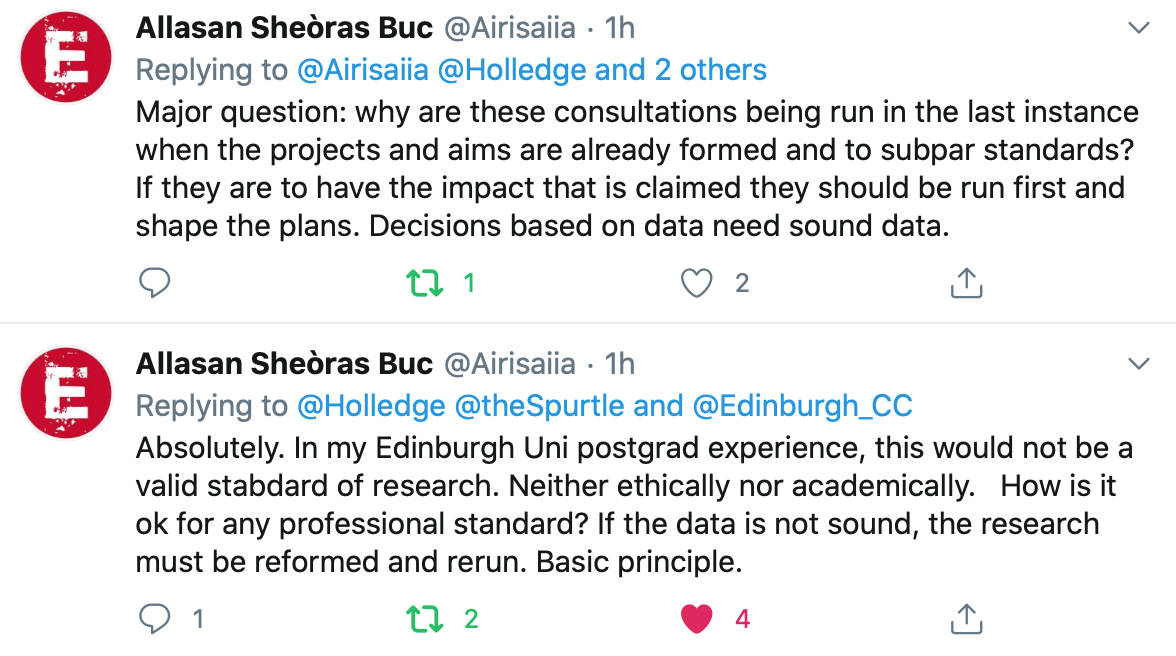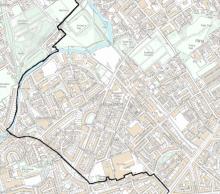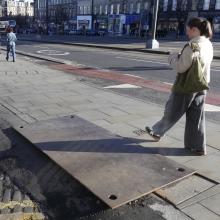
MOVE ALONG, PLEASE. NOTHING TO SEE HERE.
Readers may remember how on 1 and 3 July Spurtle reported the not-altogether-convincing launch of the Council's Thriving Green Spaces (TGS) project.
In the second of those articles, we raised the issue of an unacknowledged change to the questionnaire's wording after it had already gone live online.
We thought this was important because: (1) answers submitted by respondents before the change in wording could potentially be invalid; (2) people who had found the original wording off-putting and so didn't participate would not know that the problem had later been addressed.
In general, we reckon unacknowledged retrospective tweaks of this kind on official public platforms are bad practice. They leave commentators unable to trust the permanence and reliability of the wording they are invited to respond to, or the evidence on which they have based an opinion. They can also give the unfortunate appearance of collusion behind the scenes.
We therefore sought answers from the Council on:
-
why the change was made
-
who made the change
-
whether CEC accepts that not acknowledging the change was a mistake
-
how the mistake will be rectified. For example, will the questionnaire be cancelled and relaunched, or will those who completed the questionnaire before the change be informed and invited to resubmit, and will there be a widespread statement acknowledging the problem and inviting those who chose not to participate to think again?
-
whether further changes will be made to wording without acknowledgement.
Today we received a response from a Council spokesperson. So far as we can tell, Council and University are entirely unrepentant, don't acknowledge a matter of principle being at stake, and will cheerfully continue fiddling behind the scenes whenever it suits. The attitude seems to be that what the public doesn't know won't harm us.
Worryingly, given that in recent hours we have also seen artwork removed without acknowledgement from a Planning application involving the Council, the problem appears not to be confined to one particular department.
Read the Council spokesperson's response below (in italics), and then tell us what you think …
These surveys have been developed with the help of a number of masters students from the Landscape and Wellbeing programme at the University of Edinburgh, one of the five partners working with the Council on this project.
The current three surveys will provide the TGS project with valuable data on our greenspaces. This data is crucial to us in understanding how people use parks, why they use them and what aspirations they have for them.
The University of Edinburgh masters students were already carrying out work on these surveys and so we teamed up with them as the information they are collecting will be extremely useful in providing baseline data for us on how people currently feel about their open and green spaces in Edinburgh and their aspirations for them in the future.
We plan many more surveys and more formal consultations in the future and so feedback is very welcome so we can continually improve the engagement tools we use. We also hope that by next year we can carry on with hopefully face-to-face engagement following any guidance that is in place.
The surveys are a small part of a wide ranging citizen and stakeholder conversation.
The change you mention was made following initial feedback which had pointed out that there wasn’t a distinction between East and West Princes Street Gardens, so we consulted the University of Edinburgh and they made a small adjustment.
The reference to West PSG was made to clarify the wording very soon after the survey was launched. No one's submission will be rejected because it was a) a separate question with no influence on the rest of the survey and b) because we can separate out any specific respondents who made text comments on East PSG and use their comments separately in any report.
The Maptionnaire system allows tweaking of the survey if necessary but it keeps records of when changes were made so that responses can be logged against them and the results adjusted. The vast majority of the enormous number of responses received to date were made after these tweaks were made.
----------
[Image top-right: Wikimedia, Creative Commons]
Got a view? Tell us at spurtle@hotmail.co.uk and @theSpurtle
---------














